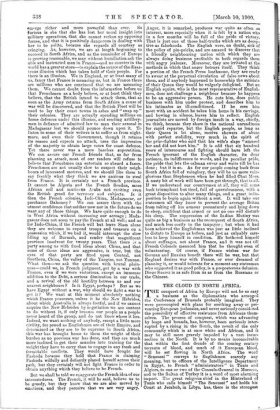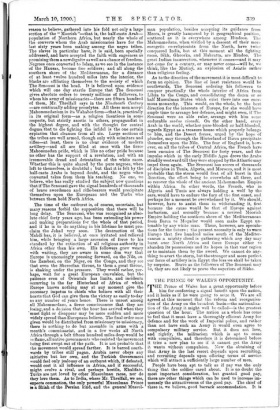THE CLOUD IN NORTH AFRICA. T HE conquest of Africa by
Europe will not be so easy a business as the diplomatists who arranged the Conference of Brussels probably imagined. They were preoccupied with plans for soothing away or pre- venting European jealousies, and never seriously considered the possibility of effective resistance from Africans them- selves. The process of conquest, which was advancing by leaps and bounds, has, however, been seriously inter- rupted by a rising in the South, the revolt of the only community which is at once white and African, and it may be still more gravely impeded by a vast insur- rection in the North. It is by no means inconceivable that within the first decade of the coming century torrents of blood, and much of it European blood, will be set flowing in North Africa. The word " Senoussi " conveys to Englishmen scarcely any meaning, but to officers of the Intelligence Department in Egypt, to French " administrators " in Tunis and Algiers, to one or two of the Consuls-General in Morocco, and to the Sultan of Turkey it is a word of most alarming import. The great religious chief in the Hinterland of Tunis who calls himself "The Senoussi" and holds his Court at Jerabub, in Libya, has, there is the strongest reason to believe, gathered into his fold not only a large section of the " Moorish "—that is, the half-caste Arab— population of Northern Africa, but nearly the whole of the converts whom the Arab missionaries have for the last sixty years been making among the negro tribes. The slaves in particular have, it is said, been specially addressed, and have accepted the faith with eagerness as promising them a new dignity as well as a chance of freedom. Negroes once converted to Islam, as we see in the instance of the Haulms, become fine soldiers ; and all along the southern shore of the Mediterranean, for a distance of at least twelve hundred miles into the interior, the blacks are affiliating themselves to the society of which The Senoussi is the head. It is believed upon evidence which will one day startle Europe that The Senoussi gives absolute orders to twenty millions of followers, to whom his army of missionaries—there are fifteen hundred of them, Mr. Threlfall says in the Nineteenth Century —are continually adding proselytes. All these men accept Mahommedanism in its Waha.bee form—that is, practically in its original form—as a religion licentious in some respects, but strictly ascetic in others, propagandist in the highest degree, and with the thought for central dogma that to die fighting the infidel is the one certain expiation that cleanses from all sin. Large sections of the tribes are well armed, though only with scimitars and rifles—at least, there is no clear evidence of modern artillery—and all are filled at once with the fierce Mahommedan pride, which is like no other pride because no other has the support of a revelation, and with an irremovable dread and detestation of the white races. Whether this is quite shared by the pure negroes, when left to themselves, is doubtful ; but that it is felt by the half-caste Arabs is beyond doubt, and the negro when converted takes from them his teaching. No one, we believe, who has really studied the subject now questions that if The Senoussi gave the signal hundreds of thousands of brave swordsmen and rifle-bearers would precipitate themselves upon the Europeans and the Turks who between them hold North Africa.
The time of the outburst is, of course, uncertain, but many reasons forbid the supposition that there will be long delay. The Senoussi, who was recognised as abso- lute chief forty years ago, has been extending his power and maling preparations for the whole of that period, and if be is to do anything in his lifetime he must pro- claim the Jehad very soon. The destruction of the Mahdi has, it is believed, at once irritated and relieved him, while bringing a large accession of force to his standard by the extinction of all religious authority in Africa other than his own. His followers grow weary with waiting, they are aware in some dim way that Europe is unceasingly pressing forward, on the Nile, on the Zambesi, on the Niger, on the Congo, and they see that even the Shereefian throne, to them a great throne, is shaking under the pressure. They would rather, per- haps, wait for a great European convulsion, but the patience even of Orientals has limits, and incidents occurring in the far Hinterland of Africa of which Europe knows nothing may at any moment give the necessary impetus to chiefs who believe with all their hearts that God can give them the victory as easily to-day as any number of years hence. There is unrest among all Mahommedans, a fierce consciousness that they are losing, and a decision that the hour has arrived when they 'must fight or disappear may be more sudden and more widely spread than Europeans believe. The final order once given would be distributed from missionary to missionary, there is nothing to do but assemble in arms with a month's commissariat. and in a few weeks all North Africa through a belt fifteen hundred miles deep would be in flame, all native governments who resisted the movement being first swept out of the path. It is not probable that the movement would spread farther. It is barred south- wards by tribes still pagan, Arabia never obeys any initiative but her own, and the Turkish Government would feel only jealousy of an outburst which, if defeated, would cost it all influence in Africa, and if successful, might evolve a rival, and perhaps hostile, liChalifate. Turks are not loved by other Mussulman races, nor do they love them. As to India, where Mr. Threlfall, we see, expects commotion, the only powerful Mussnlman Prince is a Shiah of the Persian kind, and the general Mttssul- man population, besides accepting its guidance from Mecca, is greatly hampered by it geographical position, scattered as it is everywhere among Hindoos. The Mahommedans, when vivified by a descent of their more energetic co-religionists from the North, have twice conquered India, but at this moment all the fightine. races, Sikh, Ghoorka, and Mahratta, are Hindoo. The great Indian insurrection, whenever it comes—and it may not come for a century, or may never come—will be, we think, like the Mutiny, an explosion of Asiatic rather than religious feeling.
As to the direction of the movement it is most difficult to form an opinion. The line of least resistance would be southwards, The Senoussi ordering his followers to conquer practically the whole interior of Africa from Libya to the Congo, and consolidating the dozen or so half Mussulman States which exist there into one enor- mous monarchy. This would, on the whole be the best direction for the interests of Europe, for she would have ample time to arrange her defence, and might even, if The Senoussi were an ahle ruler, arrange with him some endurable modus vivendi. On the other hand, every Arab in the world, whether pure-blooded or half-blooded, regards Egypt as a treasure house which properly belongs to him, and the Desert forces, urged by the hope of plunder, may through the Hinterland of Berea precipitate themselves upon the Nile. The fear of England is, how- ever, on all the tribes of Central Africa, the French have been enemies of The Senoussi for forty years, and the impulse which in the early Middle Ages drove the Arabs steadily westward till they were stopped by the Atlantic may impel them again. The Senoussi has scores of thousands of disciples in Tunis, Algeria, and Morocco and it is most probable that the storm would first of all burst in that direction, the effort being to overwhelm all three, and so recover the whole of the ancient Mahommedan Empire within Africa. In other words, the French, who in Algeria and Tunis are always holding a wolf by the ears would have to endure the fury of the first onset, and perhaps for a moment be overwhelmed by it. We should, however, have to assist them in withstanding it, first because the cause would be that of Europe against barbarism, and secondly because a revived Moorish Empire holding the southern shore of the Mediterranean from Berea to Mogador would soon make Egypt un- tenable by any white man. These, however, are specula- tions for the future ; the present necessity is only to warn Europa that five hundred miles south of the Mediter- ranean a mighty cloud is gathering which any day may burst over North Africa and force Europe either to abandon its possessions and its hopes in that vast region or to maintain them by the sword. We cannot do any- thing to avert the storm, but the stronger and more perfect our force of artillery is in Egypt the less we shall be taken by surprise. Brave as the followers of The Senoussi may be, they are not likely to prove the superiors of Sikhs.







































 Previous page
Previous page